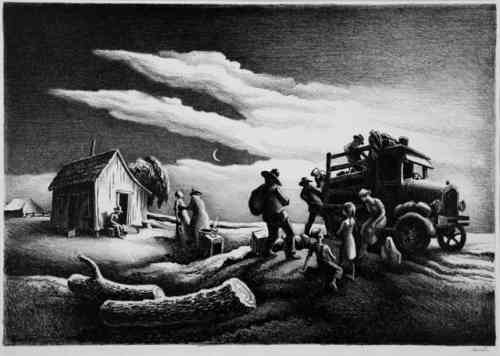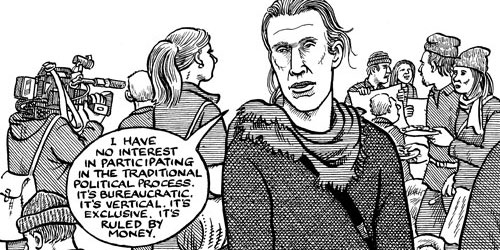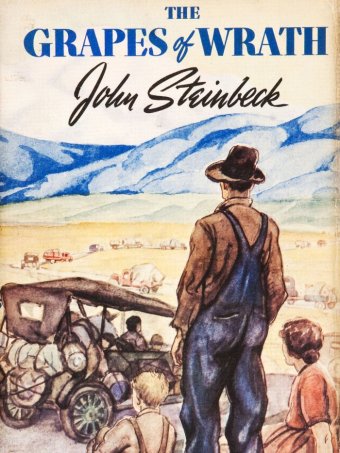Tuesday Open Thread: the grapes of wrath and beyond

THE GRAPES OF WRATH ©1939 by John Steinbeck
Men walkin' 'long the railroad tracks
Goin' someplace there's no goin' back
Highway patrol choppers comin' up over the ridge
Hot soup on a campfire under the bridge
Shelter line stretchin' 'round the corner
Welcome to the new world order
Families sleepin' in their cars in the Southwest
No home no job no peace no rest
The highway is alive tonight
But nobody's kiddin' nobody about where it goes
I'm sittin' down here in the campfire light
Searchin' for the ghost of Tom Joad
Chapter Nineteen:
Once California belonged to Mexico and its land to Mexicans; and a horde of tattered feverish Americans poured in. And such was their hunger for land that they took the land--stole Sutter’s land, Guerrero’s land, took the grants and broke them up and growled and quarreled over them, those frantic hungry men; and they guarded with guns the land they had stolen. They put up houses and barns, they turned the earth and planted crops. And these things were possession, and possession was ownership.
The Mexicans were weak and fled. They could not resist, because they wanted nothing in the world as frantically as the Americans wanted land.
Then, with time, the squatters were no longer squatters, but owners; and their children grew up and had children on the land. And the hunger was gone from them, the feral hunger, the gnawing, tearing hunger for land, for water and earth and the good sky over it, for the green thrusting grass, for the swelling roots. They had these things so completely that they did not know about them any more. They had no more the stomach-tearing lust for a rich acre and a shining blade to plow it, for seed and a windmill beating its wings in the air. They arose in the dark no more to hear the sleepy birds’ first chittering, and the morning wind around the house while they waited for the first light to go out to the dear acres. These things were lost.
Crops were reckoned in dollars, and land was valued by principal plus interest, and crops were bought and sold before they were planted. Then crop failure, drought, and flood were no longer little deaths within life, but simple losses of money. And all their love was thinned with money, and all their fierceness dribbled away in interest until they were no longer farmers at all, buy little shopkeepers of crops, little manufacturers who must sell before they can make. Then those farmers who were not good shopkeepers lost their land to good shopkeepers.
No matter how clever, how loving a man might be with earth and growing things, he could not survive if he were not also a good shopkeeper. And as time went on, the business men had the farms, and the farms grew larger, but there were fewer of them.
Farming became industry, and the owners followed Rome, although they did not know it. They imported slaves, although they did not call them slaves: Chinese, Japanese, Mexicans, Filipinos. They ice on rice and beans, the business men said. They don’t need much. They couldn’t know what to do with good wages. Why, look how they live. Why, look what they eat. And if they get funny--deport them.
Farms grew larger and the owners fewer. And there were pitifully few farmers on the land any more. And the imported serfs were beaten and frightened and starved until some went home again, and some grew fierce and were killed or driven from the country. And farms grew larger and the owners fewer.
Crops changed. Fruit trees took the place of grain fields, and vegetables to feed the world spread out on the bottoms: lettuce, cauliflower, artichokes, potatoes--stoop crops. A man may stand to use a scythe, a plow, a pitchfork; but he must crawl like a bug between the rows of lettuce, he must bend his back and pull his long bag between the cotton rows, he must go on his knees like a penitent across a cauliflower patch. And it came about that owners no longer worked on their farms.
[video:https://youtu.be/KHg9keCGmbQ?t=8]
They only farmed on paper; and they forgot the land, the smell, the feel of it, and remembered only that they owned it, remembered only what they gained and lost by it. And some of the farms grew so large that one man could not even conceive of them any more, so large that it took batteries of bookkeepers to keep track of interest and gain and loss; chemists to test the soil, to replenish; straw bosses to see that the stooping men were moving along the rows as swiftly as the material of their bodies could stand.
Then such a farmer really became a storekeeper, and kept a store. He paid the men, and sold them food, and took the money back. And after a while he did not pay the men at all, and saved bookkeeping. “These farms gave food on credit. A man might work and feed himself; and when the work was done, he might find that he owed money to the company. And the owners not only did not work the farms any more, many of them had never seen the farms they owned.
And then the dispossessed were drawn west--from Kansas, Oklahoma, Texas, New Mexico; from Nevada and Arkansas families, tribes, dusted out, tractored out. Carloads, caravans, homeless and hungry; twenty thousand and fifty thousand and a hundred thousand and two hundred thousand. They streamed over the mountains, hungry and restless--restless as ants, scurrying to find work to do--to lift , to push, to pull, to pick, to cut anything, any burden to bear, for food. The kids are hungry. We got no place to live. Like ants scurrying for work, for food, and most of all for land.

Today is World Day Against Child Labour, an annual observance established in 2002 by the UN’s International Labour Organization (ILO) to raise awareness about and activism around the issue of child labor, defined as “work performed by children who are under the minimum age legally specified for that kind of work, or work which, because of its detrimental nature or conditions, is considered unacceptable for children and is prohibited.”In 1904 ... fifty thousand members of the Amalgamated Meat Cutters and Butcher Workmen employed in meatpacking plants walked off their jobs; their demands included equalization of wages and conditions throughout US plants.
In 1929 ... 2000 Students on strike take over the main building of the Mexican National University. The students held hostages and put a red flag over the building. They demanded the university rector to resign, but he refused. Eventually the students let the hostages go, but they still kept guard over the building.
In 1912 ... Massachusetts became the first state to adopt a minimum wage law. Other states passed similar laws later that year.
In 1945 ... the US Supreme Court invalidated two sections of a Florida law: one required state licensing of paid union business agents, the other required registration with the state of all unions and their officers.
In 1981 ... Major League Baseball strike began, forcing the cancellation of 713 games. Most observers blamed team owners for the strike; they were trying to recover from a court decision favoring the players in free agency.
In 1982 ... around 700,000 demonstrators gathered in New York City's Central Park demanding an end to the proliferation of nuclear weapons.
[video:https://youtu.be/L8TcpCSG7EU]
[video:https://youtu.be/VZLyk9pIaHs]
[video:https://youtu.be/cU4BdgZyXIM]
[video:https://youtu.be/YmVNTDM4nHc]
[video:https://youtu.be/ZzFsPSr2RR8]
[video:https://youtu.be/fjr4DD51PgQ]
[video:https://youtu.be/je2xdnbvRi4]
Alas, the more things change ... the more they remain the same.
We end with reading from chapter 29. See you next week.




Comments
perhaps the environmental piece is most like today?
...or our future....
from chapter 1
...
The new migration has already begun...
Thanks for the OT!
“Until justice rolls down like water and righteousness like a mighty stream.”
Much like the Bible, nobody reads Steinbeck
But they worship the words as if they are sacrosanct, not bothering to actually understand them.
Sorry, just remembering that in Salinas, CA there's a huge museum dedicated to Steinbeck. Right on the other side of the tracks from the homeless encampments.
The irony could not be more complete.
[video:https://www.youtube.com/watch?v=6GVJpOmaDyU]
I do not pretend I know what I do not know.
"The sky plane caught fire over los Gatos canyon"
Things change, but maybe not so much.
That, in its essence, is fascism--ownership of government by an individual, by a group, or by any other controlling private power. -- Franklin D. Roosevelt --
Morning - interesting interview with Greg Brown
Most of his songs fragments appear in his head, drifting in and out. When it becomes annoying he writes them down. Lucky for us he did not simply get a prescription drug to silence the sounds in his head.
Still yourself, deep water can absorb many disturbances with minimal reaction.
--When the opening appears release yourself.
A-Shit Pie Interview on Killing Net Neutrality
Classic Orwellian Doublespeak. I haven't heard Trump tweet to take credit for the Death of Net Neutrality. Apparently even f**k head Trump doesn't think it's defensible.
But A-Shit Pie says he did it to benefit us commoners. Hahaha.
Donnie The #ShitHole Douchebag. Fake Friend to the Working Class. Real Asshole.